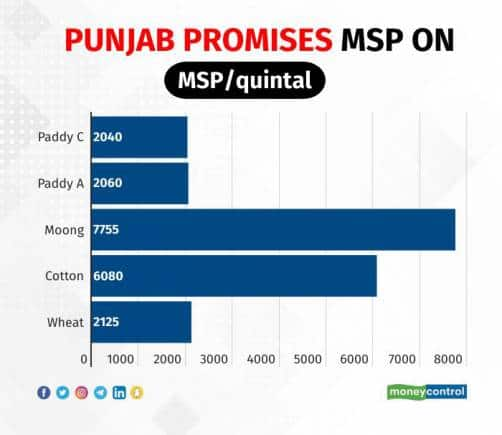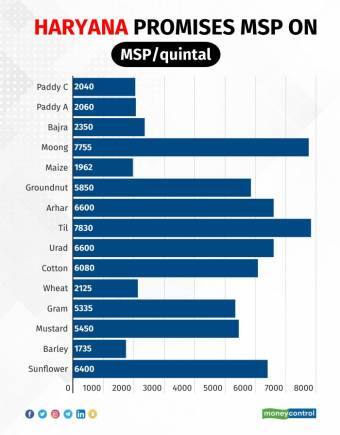



Gajjar Singh (48), a resident of Bhedpura village in Punjab’s Patiala, sowed moong (green gram) for the first time last year. It will perhaps be the last time, too.
In an attempt at crop diversification, the Punjab government launched a policy before the last summer season (March-June 2022) to procure summer moong at a Minimum Support Price (MSP), subject to moisture content norms.
In response, farmers produced a record 405,000 quintals of summer moong but were met with disappointment. Punjab Mandi Board records show they had to sell 86 percent of the total production in open markets below the MSP of Rs 7,275 per quintal. The government’s share was only 48,000 quintals.
While no official statement was released explaining the low procurement, district agriculture officials said that moong wasn’t sold at MSP primarily due to ‘quality concerns’ and high moisture content.
This led to widespread resentment among farmers of the state who had sowed the bean at the promise of a fair price.
In an attempt to make up for the loss suffered by farmers, the state government in July decided to pay the difference between purchase price and the MSP with Rs 1,000 per quintal as the upper limit.
“I had a good produce of about 2,500 kgs of moong on my 5-acre land last year. Had I been given the government MSP, I would have gained a considerable amount but I had to sell it in open market for Rs 5,000 per quintal. The Rs 1,000 that I received did not make up for the losses, so I decided not to plant anything this year,” Gajjar Singh told Moneycontrol.
Farmers generally do not grow crops that are not backed by a government-mandated MSP because they either find no takers or have to sell it outside the mandis for almost no profits.
The government of Punjab currently offers MSP on only four crops -- wheat, paddy, cotton and moong, Mandi officer of the Punjab government Rajnish Goel told Moneycontrol.

Also read: Farm Uneasy | Battered by freak weather, Punjab and Haryana farmers losing hope
Farm Uneasy | Generational gift for farmers of Haryana & Punjab: DebtWhy the push for crop diversification?In the past five decades or so, increasing agricultural production and ensuring food security has been the main concern of policy makers. But the side-effects of the Green Revolution have now become visible in the form of low productivity and crops over-reliant on chemicals.
Crop diversification would be a way not only to improve soil health but also to provide better conditions for food security and enable farmers to grow surplus products for sale in the market, helping them earn higher income.
Crashing prices another demotivationPunjab’s farmers have suffered other misfortunes. A crash in prices of vegetables because of high yield and the absence of sufficient demand, for one.
Prices of potato, capsicum and tomatoes crashed as low as Rs 2 per kg between February and April this year. This acted as another demotivation from growing moong.
“We cannot farm on uncertainty. We need to know our produces will be picked up. The farmers put in a lot of money and months of labour on every crop. We would rather have vacant land than selling the produce at a loss,” said farmer Kashmir Singh of Patiala’s Dhablan village.
“The price crash has been so hard that farmers have been offered as low as Rs 0.50 per kilo of capsicum produce. This has happened with several vegetables and the prices of all horticulture crops took a steep fall. There was a big difference in wholesale and retail prices and in the absence of any government checks, growers felt robbed,” said Hussain, the former agriculture secretary.
That, he said, explains the farmers’ preference for growing the staple wheat and paddy.
A visit to villages of Punjab’s Bathinda, Sangrur and Patiala districts showed that most farmers only grew fodder for their cattle and livestock during the summer months in between growing wheat and paddy.
“We either grow maize or jowar to support food for our livestock throughout the year. We have no MSP assurance on any other crop and thus do not waste our time with it,” Kashmir Singh said.
 The farmers of Punjab suffered another misfortune when prices of vegetables crashed this year because of high yield and the absence of sufficient demand between March- April.Farm Uneasy | Two-fold rise in production costs jar farmer profitsPunjab vs Haryana
The farmers of Punjab suffered another misfortune when prices of vegetables crashed this year because of high yield and the absence of sufficient demand between March- April.Farm Uneasy | Two-fold rise in production costs jar farmer profitsPunjab vs Haryana Haryana’s Director General of Agriculture Narhari Banger said: “The state has taken several steps to promote the growth of a third crop to raise farmer incomes, including bringing various crops under MSP. Moong is not being procured as the farmers generally find better prices outside mandis.”
The state has brought in about 14 crops under MSP assurance and is attempting to do better than its counterpart Punjab.
During a visit to villages in Haryana’s Jind and Fatehabad, Moneycontrol found that farmers were regularly growing crops including mustard, bajra, cotton and maize.
Promising MSP on various crops seems to have worked in Haryana’s favor.


Professor of Sociology at the Chandigarh-based Panjab University Vinod Kumar insists that price assurance is all that is needed to motivate farmers to sow a third crop.
“Haryana offers MSP on moong, but does not procure the crop. It reasons that higher prices are offered by private players for the same. But the farmers remain wary of this,” he added.
Other ways the government can help is by offering storage space and marketing muscle for horticulture crops such as fruits and vegetables so price crashes do not affect farmers’ earnings, said Hussain.
Discover the latest Business News, Sensex, and Nifty updates. Obtain Personal Finance insights, tax queries, and expert opinions on Moneycontrol or download the Moneycontrol App to stay updated!
Find the best of Al News in one place, specially curated for you every weekend.
Stay on top of the latest tech trends and biggest startup news.